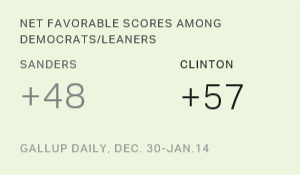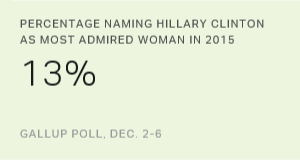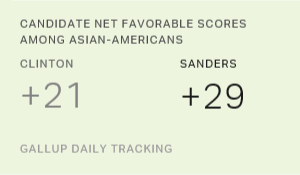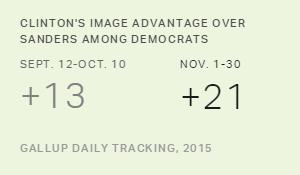Story Highlights
- Clinton's net favorability at +57 among Dems; Sanders' at +48
- Sanders sees gains among race, gender and age groups
- Clinton maintains major edge among blacks, Hispanics
WASHINGTON, D.C. -- As Democratic presidential candidates Hillary Clinton and Bernie Sanders approach their final debate before the Feb. 1 Iowa caucuses, Clinton (+57) maintains a net favorability advantage over Sanders (+48) among Democrats and Democratic-leaning independents. While Clinton's current score is about par for the course, Sanders is his highest to date, as he has become more familiar to the party faithful.
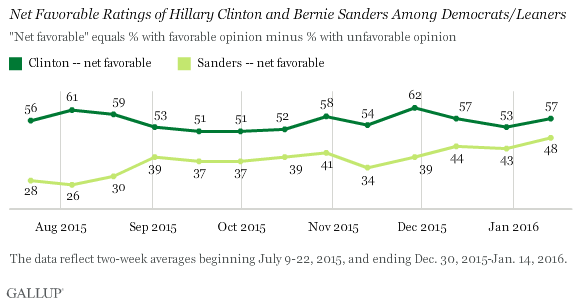
Clinton's higher net favorable score reflects how much more familiar Americans are with her than they are Sanders, with 95% of Democrats able to rate her either positively or negatively, compared with 70% for Sanders. But those who are familiar with both candidates are slightly more likely to view Sanders favorably (+84) than Clinton (+80).
For Clinton, who enjoys near-universal familiarity among those in her party and Americans as a whole, the favorability advantage she has over Sanders is more modest than the advantage she had earlier on in the race.
Perhaps sensing the threat from a gaining Sanders, Clinton's campaign has recently unleashed what are arguably its most direct attacks on the Vermont independent, with Clinton's daughter Chelsea telling a New Hampshire crowd that Sanders would "dismantle" the Affordable Care Act. The Sanders campaign was swift in its rebuttal of the younger Clinton's comments, saying they were untrue.
With mere weeks left before the start of the party primary schedule, Sanders' rise in net favorability among Democrats and Democratic-leaning independents is evident across gender, age and racial groups. Compared with his ratings in November, Sanders' net favorability since December has grown among all groups, with his ratings among whites and those younger than 30 now each exceeding +50.
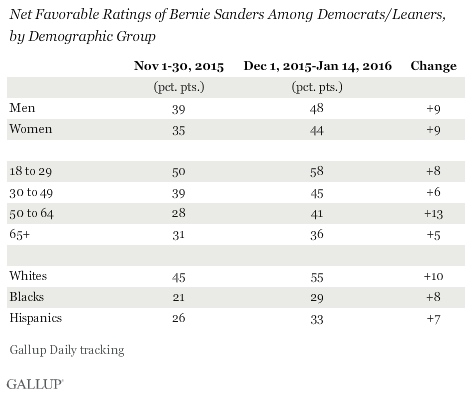
Clinton's ratings among these groups over the same time have not improved, sagging slightly in all demographics except Democrats and Democratic leaners aged 65 and older. Still, Clinton bests Sanders in most demographic groups except among whites, which Sanders holds a modest six-point advantage, and adults younger than 30, among whom he outperforms Clinton by 23 points in net favorability.
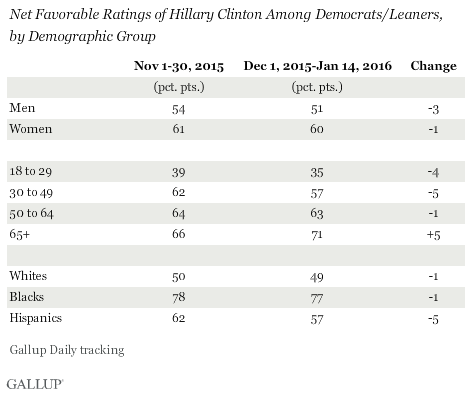
Although Sanders' standing has improved with blacks and Hispanics, his image among these groups still falls well short of Clinton's. The candidates recently participated in an Iowa forum focusing on minority issues, and Sanders recently began a tour of black colleges to make headway with this group.
Bottom Line
It is crunch time for the candidates. This Sunday's Democratic debate in Charleston, South Carolina, may be the best remaining chance for both to make their case to a national audience before the primary season takes off.
For Sanders, a sprint across the nation's historically black colleges may not yield much for his prospects in Iowa and New Hampshire, where more than nine in 10 residents are white. But this approach could chip away at Clinton's black support there and in other states while solidifying his rapport with millennials. Additionally, Gallup has found low familiarity with Sanders among blacks, so the more he can do to boost his familiarity, the better.
Meanwhile, Clinton's prospects hinge on her ability to retain her lead, which she, thus far, has been successful in doing. She could do well to find ways to resonate more with younger Democrats and Democratic-leaning adults. Clinton had already fallen short among this age group compared with Sanders, and the past several weeks saw her net favorability with these adults weaken while Sanders' gained even more traction.
Historical data are available in Gallup Analytics.
Survey Methods
Results for this Gallup poll are based on telephone interviews conducted Dec. 30, 2015-Jan. 14, 2016, on the Gallup U.S. Daily survey, with a random sample of approximately 800 adults identifying as Democrats or independents who lean Democratic, aged 18 and older, living in all 50 U.S. states and the District of Columbia. Each candidate was rated by a random subset of respondents during this period. For results based on these samples, the margin of sampling error is ±4 percentage points at the 95% confidence level. All reported margins of sampling error include computed design effects for weighting.
Each sample of national adults includes a minimum quota of 60% cellphone respondents and 40% landline respondents, with additional minimum quotas by time zone within region. Landline and cellular telephone numbers are selected using random-digit-dial methods.
Learn more about how the Gallup U.S. Daily works.
